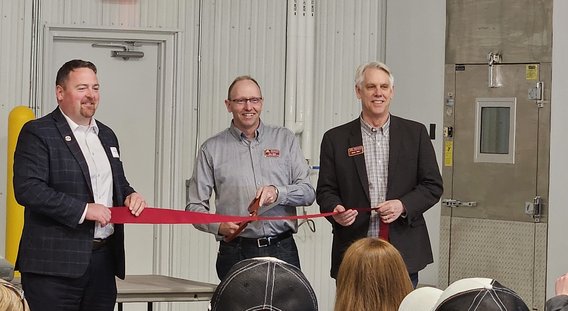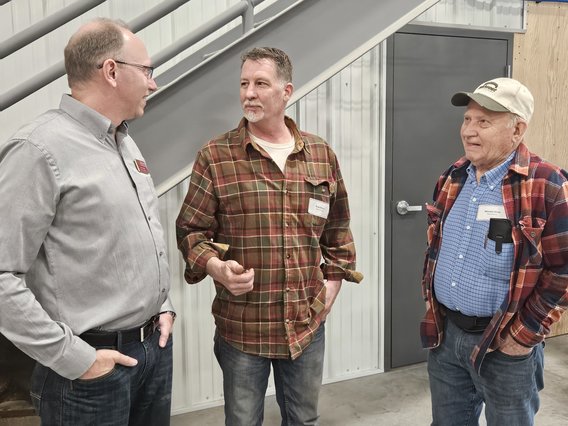
On April 5, the University of Minnesota Sand Plain Research Farm (SPRF) near Monticello, Minnesota, hosted around 60 supporters for a ribbon cutting ceremony at their new building. The 14,760 square foot facility holds the offices for full-time employees, a conference room, bathrooms and a shower, a breakroom, and unconditioned space for storing equipment not-in-use. In addition, part of the building serves as the shop where repairs on farm equipment will take place. Finally, a walk-in cooler is available for sample and seed storage and a large room hosts the potato-sorting machinery necessary for SPRF’s potato breeders.
The SPRF property is leased from and in cooperation with Xcel Energy with the primary mission to conduct research on agronomic and horticultural crops under both irrigated and non-irrigated conditions. In 2017, Xcel Energy notified the University of their intent to develop the previous property and to help relocate the SPRF to a new parcel between its two power plants. In 2020, all research activity at the old site was concluded and had transitioned to its current location.
At the event, SPRF Director of Operations Ron Faber told attendees, "We have closed a chapter in the Sand Plain Research Farm's history, and this new building finishes the transition to this new site and begins our new chapter.” Prior to the relocation, the SPRF had conducted research at the former site since 1976. Many of the invited attendees were pivotal players in supporting SPRF throughout the years and through this transition period. Additionally, key individuals from Xcel Energy – job site supervisors, land siting managers, etc. – were in attendance. John Marshal, Regional Vice-President of Community Relations in the Midwest Region, also spoke at the event to highlight the renewed partnership between Xcel Energy and theU of M . By providing the new building as a lease-improvement at the new location, Xcel Energy has shown their commitment to the work of the Sand Plain Research Farm and the greater U of M research community.
This commitment is important because the SPRF provides a unique, coarse-textured soil site for pursuing research on both irrigated and non-irrigated crops as well as the critical pest and land-management challenges that producers face throughout the region. SPRF is the primary site for the U of M’s irrigation research as well as a valuable site for faculty to bring students for hands-on learning opportunities.

Environmental stewardship underlies much of the research being done at the SPRF. In an effort to protect and preserve Minnesota’s water resources, researchers are studying ways to utilize new technologies, reduce irrigation applications through advanced scheduling methods, and find best management practices for fertilizer use in both common and specialty crops. Studies are developing new varieties and refining innovative cropping systems that add diversity and value to producers while also protecting the soil, nutrients and water resources in the region.
“The Sand Plain Research Farm, as one of 10 Research & Outreach Centers across the state, is uniquely situated within the sandy soils of central Minnesota and within a short driving distance from our Twin Cities campus,” said Associate Dean for the Minnesota Agricultural Experiment Station and CFANS Research and Outreach Center, Joleen Hadrich. “Through this partnership with Xcel Energy, the University is ensuring that this crucial research location remains available to faculty and student researchers into the future.”
Research will continue at the Sand Plain Research Farm this summer and Faber is already in discussion with local community groups and conservation groups to explore other long-term demonstration projects.
